I'M ONE TO TALK
Our Blog Posts will help you reach your full potential in becoming a confident conversationalist. New topics each week.
Accelerating Feedback in Business

Timeouts, huddles, conversations in the dugout and suggestions from a caddy are all forms of feedback that happen during sporting events.
It's not just a break in the action, those conversations are critical for making adjustments, staying on track and being successful. When you think about it that way, it's easier to think out side the box scores and borrow a few conversation tactics from sports.
As the video points out, it's absurd to think that a coach will withhold critical feedback until the end of the season or even the midway point of the season. So why would you do that with your team at work?
Instead of dragging out the process or delaying conversations about feedback until it's time for mid-year reviews or yearly performance reviews, let's use sports to help accelerate the feedback process. When you see a time out called, a team huddle or a coach yell, you're watching feedback in action and this is what you're seeing:
- Communication that's very direct
- A short, con ...
Forward Progress

If you measure success by where you end up, you could be missing out on what you actually gained.
Think about it this in terms of your performance review or year-end reviews. The ultimate measure of success is meeting or exceeding a goal, but that's not the only way to measure growth, lessons learned and skills you obtained or strengthened.
There is value in measuring forward progress. You see it every week during football games. This is one of the ways to think outside the box scores and find parallels between sports and business.
If it feels like you move one step forward and then two steps back, only count the step forward. It's called forward progress.
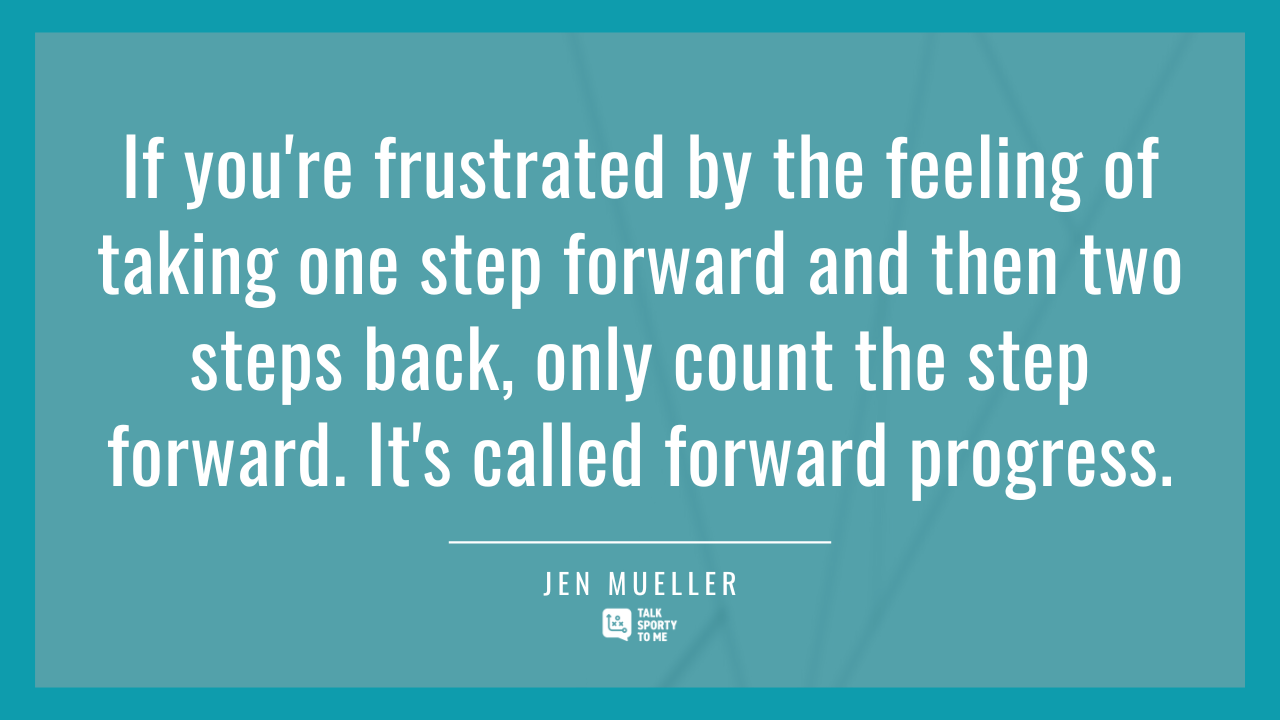
Every week I'm posting a new video on You Tube to encourage Thinking Outside the Box Scores. You can find those videos here and subscribe to be among the first to see them.
Don't Skip the Project Debrief
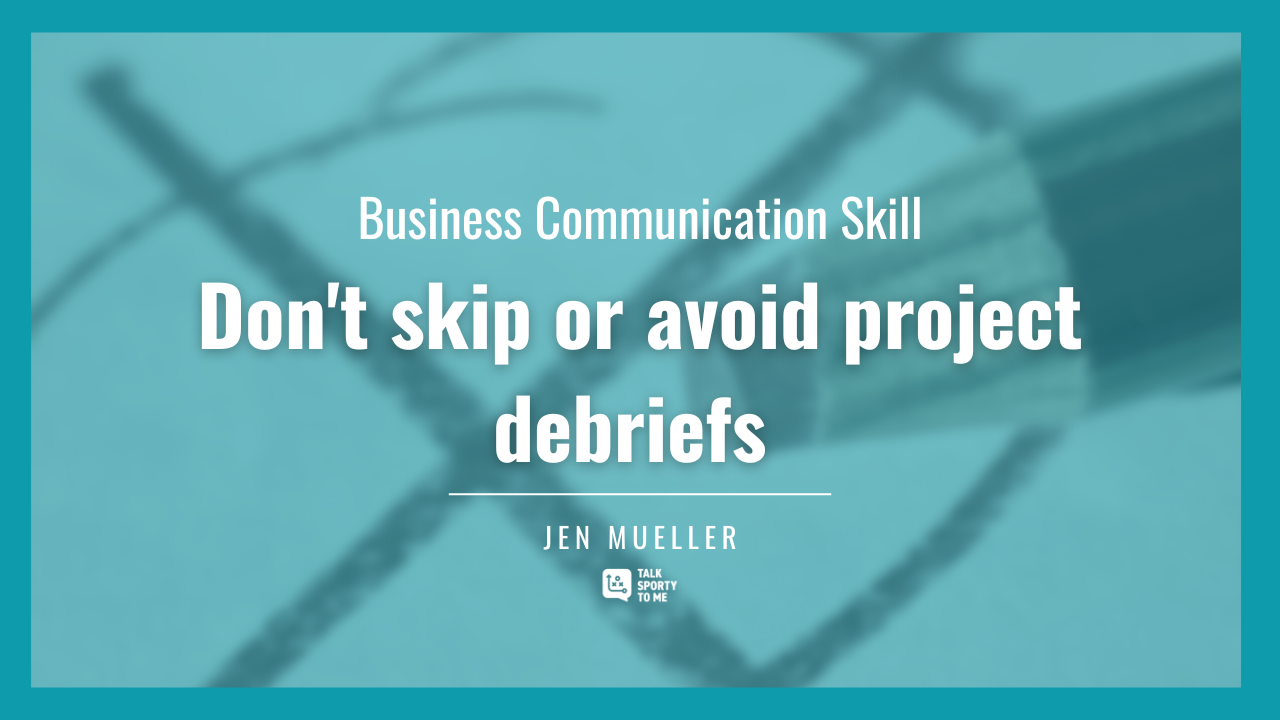
If the last thing you want to do after finishing a project is a debrief, I get it.
I’m not particularly fond of re-watching past TV shows/segments I’ve produced. When I’m done, I’m done and I’m ready to move on. Except that’s not a game plan for success. Sports gives us a great example and reminder of that.
As the sideline reporter for the Seattle Seahawks I can tell you that every Monday is “Tell the Truth Monday” at the Seahawks facility. Everyone reviews film, (Yes, I know it’s not actual film, but they still call it film study.) They highlight the successes, study the failed plays and have honest conversations about what went right and what went wrong because the film, as they say, doesn’t lie. I’ve covered more than 250 games for the Seahawks, including outcomes you don’t want to talk about much less re-live on Monday, but they do it anyway because it’s one of the ways you get better.
Let’s bring this back to business. NFL teams have weekly projects. We call them games, but ...
I Was Wrong. No apologies needed.

There is a difference between saying "I was wrong" and "I'm sorry." Both are important, but you don't necessarily need to apologize if you guessed wrong or your educated guess didn't pan out.
I was completely wrong about how the Seahawks game in Germany would play out. It gave me the perfect opportunity to practice useful communication skill in business.
As I mentioned in the video there are times an apology is necessary, but I've seen far too many people (especially women I've worked with) default to "I'm sorry." Here's what happens when you do that: you take on unnecessary blame and criticism, add pressure on yourself and send a message that you're responsible for any and all failures. That's just not true and it doesn't position you well for future opportunities.
Here's where sports can help us differentiate between "I was wrong" and "I'm sorry." It starts with the question "Who do you think will win the game?" The answer is a best guess and fans get it wrong all the time.
...3 Reasons to Talk Sporty During Performance Review Season

Could you imagine having a performance review every week?
Or having to talk about every outcome (good and bad) your team produced in a week?
Even worse, could you imagine pointing out shortcomings and pointing out the losers in the group?
Sounds a little cringy in a business setting doesn’t it?
But as sports fans we do these things all. the. time. It's called cheering. It’s how we talk about games. It’s the criticism we dish out after a disappointing loss when we don’t have any problem calling out the player whose slump is bringing down the rest of the team.
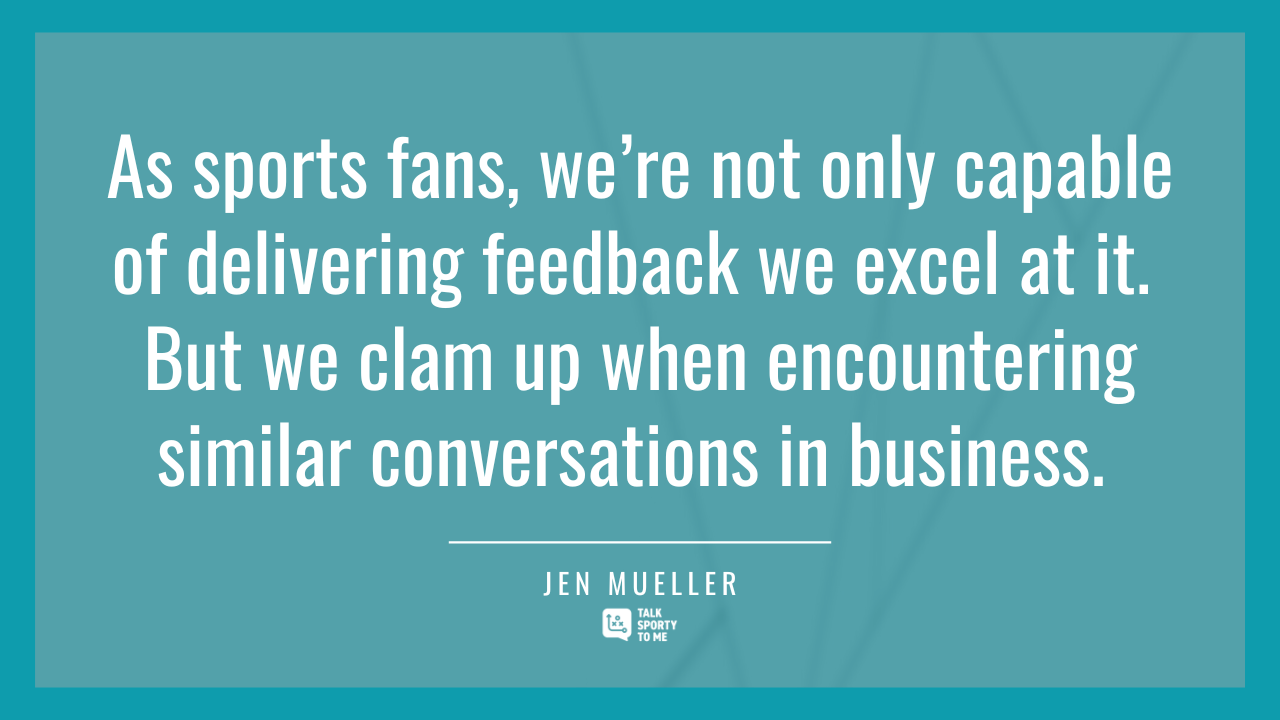
As sports fans, we’re not only capable of delivering feedback we excel at it. And then we clam up when we encounter similar conversations in business. We dread performance reviews. We shy away from tough conversations. We avoid critical feedback.
Here are a few gentle reminders of what sports fans already know:
Feedback is both expected and obvious in sports. The dropped ball, costly error, missed free throws... it's obvi...
Performance review season: Communicating Your Value

Hard work pays off, but it doesn’t necessarily speak for itself. You have to be able to articulate your value because the answer to the question: “Doesn’t the company know how hard I work?” is “Probably not.”
Advocating for yourself starts with your communication skills. You don’t need to brag about what you’ve accomplished, but you do need to realize that everyone (including your manager, CEO, Founder, etc…) is busy. As long as a job is getting done no one looks too closely at the effort behind how it got done.
It’s on you to articulate how you affected the outcome.
As you can tell in the video I get very passionate talking about this particular communication skill. There are a lot of things out my control, but I can always control my messaging and the way I talk about my value and success.
If you struggle talking about your successes I get it. My parents taught me that you didn’t need to tell anyone how hard you worked because hard work would get noticed. In a corporate set...
Talk Sporty 201: Do you want to dialogue or vent?
"What was he thinking?"
"How could the team be so bad?"
"What the heck happened in that game?"
Every sports fan asks questions like these. It's part of being a fan and debating decisions is one way to talk about a game, but not every one wants to dialogue and discuss what happened. Sometimes fans want to vent about a call they hated or a disappointing outcome.
Venting is different than dialogue. There's a place for both, but it's helpful if you share that objective at the beginning of the conversation.
As a sports broadcaster who's in the clubhouse and talking to coaches and managers about the decisions that get made, I can offer insight and have a conversation about why things happened in a game. But that's not helpful if I'm talking to someone who just wants to vent. Telling me at the outset of the exchange saves time and prevents a lot of frustration. In fact, being clear on your objective in a conversations you have with friends, family and colleagues does the same thin...
5 Reasons to Become an NFL Fan

We are a quarter of the way through the NFL season. If you’re not already a fan, now is a great time to get on board. What’s in it for you? Multiple relationship building opportunities in business.
- Everyone is doing it. (just about.) I know your mom told you it wasn’t a valid defense, but the NFL could be the exception. Just consider that 75 of the top 100 watched programs in 2021 were NFL games. Surveys show that about half of all Americans say they’re NFL fans. That translates to about 164 million NFL fans in the U.S.
- Strength in Numbers. With that many fans it’s not just about becoming part of the cool club, it’s about all the relationships you can cultivate as a result of being a fan. Being a fan gives you common ground and easy access to all the other football fans in the U.S. Who do you want to do business with?
- Headline Generator. Whether you become a fan or not, the NFL season will dominate headlines from now through February. In fact, the NFL makes headlines year-roun ...
Tips for Tough Conversations
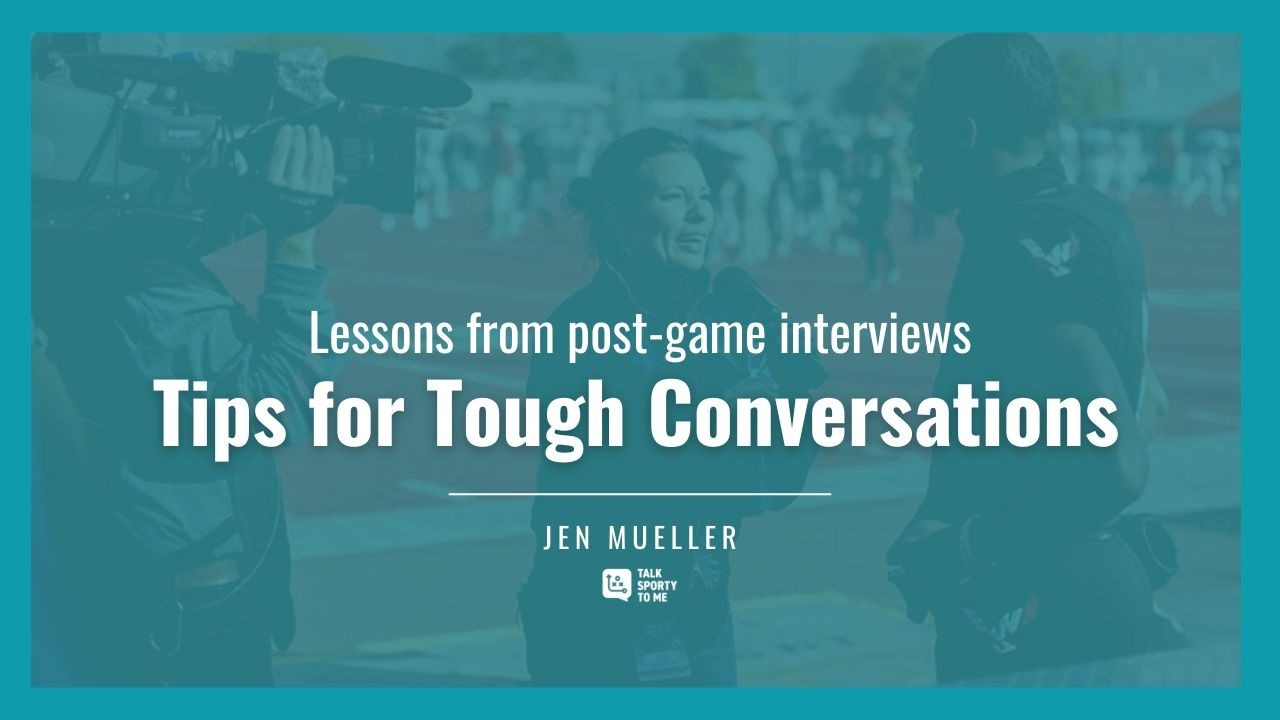
I talk to losers.
It is literally part of my job.
When people find out I work in sports broadcasting they automatically jump to the cool parts of the job like being on the field and talking to players after a win. But that’s only part of my job. I talk to players and coaches win or lose. I talk to players after making spectacular plays and after they dropped a pass that could have been the game-winning touchdown.
Not all interviews are fun. Not all interviews are easy. Sometimes those conversations are tough and ones that I would rather not have, but as I mentioned it’s part of my job.
It’s also part of your job to have tough conversations and address mistakes, errors and shortcomings. I know you want to avoid them. I also know it’s better if you don’t. As someone who’s forced to have these conversations on a weekly (if not daily) basis here’s what I know to be true: Being direct and straightforward is the kindest and often easiest way to have the tough conversation.
The athletes ...
Small Talk Checklist

A quick search about small talk and effective small talk reveals lists of questions, articles on the “necessary evil” of it and hacks to make it easier.
What if you tried to personalize it instead of trying to avoid it? Instead of arming yourself with a list random questions or looking for an easy way out, what if you prepared for the conversation and walked away from the interaction having accomplished something?
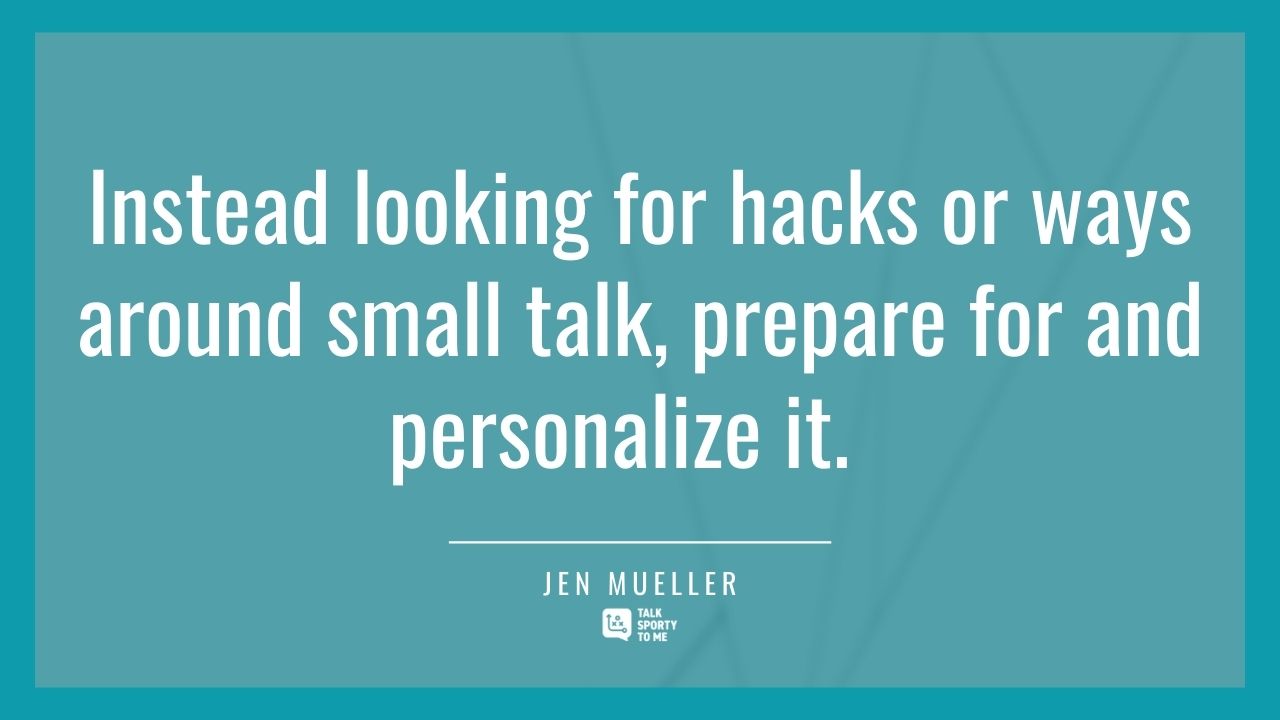
If you consider small talk a necessary evil of course you’re going to try and avoid it. If it’s always awkward you’re not going to initiate it and if you think it’s a waste of time you won’t bother putting yourself in position to have the conversation in the first place.
Small talk can be all of those things. Often because it’s not the conversation we prepare for.
We prepare for the big moments and the “real” conversation. We think small talk is something we endure or blow off altogether.
Except it can also be the most pivotal moment in any conversation. Small talk...


